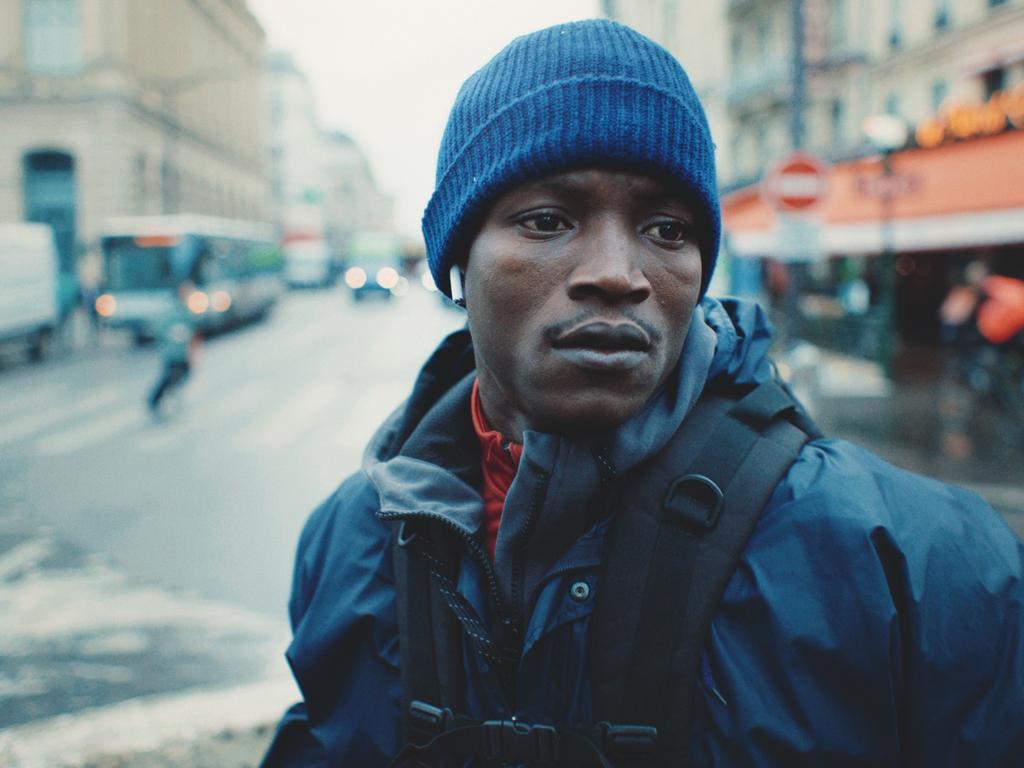Film about a homeless delivery driver one of the best you’ll see this year
The Story of Souleymane follows an asylum seeker in Paris in the days leading up to an immigration interview to decide his fate.

The Story of Souleymane (M)
French language with English subtitles
93 minutes
In cinemas
★★★★
The French social-realist drama The Story of Souleymane, which unfolds over two days in Paris and centres on an asylum seeker from the West African nation of Guinea, is one of the best films I have seen this year.
Souleymane Sangare (Guinean first-timer Abou Sangare) works illegally as a meal delivery driver. His bicycle and his mobile phone represent his livelihood. He “rents” the job from Emmanuel (Emmanuel Yovanie), a legal immigrant from Cameroon, who rips him off.
He is two days away from an interview with French immigration authorities that will decide his bid for asylum. He is memorising a political prisoner-torture story written for him, for a fee, by Barry (Alpha Oumar Sow), a compatriot who is a legal immigrant. “Tell it like facts,’’ Barry advises. He sleeps in a homeless shelter. He spends his days, and most of his nights, delivering food to homes throughout Paris. Every minute is frenetic, desperate and stressful. “I don’t have time to talk,’’ he tells his friends.
Watching him will make you think about your own home deliveries from Uber Eats or whoever. A woman in an up-market apartment cancels the order because the paper delivery bag is crumpled. Later he delivers a pizza to an old man and the exchange between them shows the kindness of strangers on both sides.
This film is directed by French filmmaker Boris Lojkine. His 2019 biopic, Camille, centred on French photojournalist Camille Lepage, was set in Africa.
Lojkine co-wrote the script for The Story of Souleymane with Delphine Agut.
Sangare is a revelation in the lead role. He was discovered not in a casting call but when the filmmakers, as part of their research, interviewed undocumented immigrants working as meal delivery drivers. Everything he does looks real. Indeed this film often feels like a from-the-streets documentary rather than an acted drama.
Sangare, a mechanic by trade, has won awards at the French Cesars and at the Cannes Film Festival and his face has graced billboards in the French capital. Yet at the time of writing, his own immigration status remained in question.
We learn Souleymane’s backstory via the phone calls he makes home. He calls his ailing mother and, in a bittersweet extended scene, talks to the woman he loves and who loves him in return. However, “Allah did not unite our fates”.
This movie opens with Souleymane in the waiting room preparing for the immigration interview. He wipes a spot of blood - one of the hazards of being a delivery driver - from the cuff of his crisp white shirt. We then cut to the two days leading up to this moment.
Then the interview takes place. The immigration official (French actor Nina Meurisse, who is brilliant) is sympathetic but meticulous. It’s clear she cares. Yet it’s not her job to grant asylum to liars. She quietly, gently checks and crosschecks Souleymane’s story. The ending is one of the best I have seen.
We each come out of cinemas with our own feelings about what we just saw. Mine was that waking up in my own bed, in my own house, in a country where I’m welcomed is not something to be taken for granted.
The Shrouds (MA15+)
120 minutes
In cinemas
★★
Canada’s David Cronenberg is a talented filmmaker but The Shrouds is far from his best work. For that I recommend the crime thrillers Eastern Promises (2007) and A History of Violence (2005) and his remake of The Fly (1986).
His new film has a multi-national cast, including Australia’s recent Oscar nominee Guy Pearce, all of whom look lost in translation. As the film is in English, their confusion can only be sheeted home to the writer-director Cronenberg.
The setting is Toronto where the main character, Karsh (French star Vincent Cassel), part-owns GraveTech, a hi-tech cemetery where the dead are buried in shrouds and their decomposition broadcast live to a screen on the tombstone, or to the phone or laptop if the family has purchased that level of access.
One of the interred is Karsh’s wife Becca (German actor Diane Kruger). She died four years ago and he is still struggling with her loss. “I can see what’s happening to her. I am in the grave with her and it makes me happy,’’ he says of Shroudcam.

He’s close friends with Becca’s sister Terry (also Kruger) and has a Siri-like virtual assistant named Hunny (voiced by Kruger). Terry’s ex-husband, Maury (Pearce), had a hand in the creation of GraveTech and Hunny. Pearce does not speak in his native accent so the running joke in which Hunny transmogrifies into a koala seems odd.
Karsh has lots of dreams in which his wife is naked. “I lived in her body,’’ he recalls. She’s beautiful but as the dreams continue it’s worth noting she died of bone cancer and Cronenberg is known for the body horror genre.
The graves are vandalised. Is it ecoterrorists? Is it China or Russia tapping into the tech for surveillance purposes? Does it have something to do with the Hungarian version of Elon Musk who wants to bring GraveTech to Budapest? Or his blind wife? Or the oncologist who had an affair with the teenage Becca and then treated her cancer?
Cronenberg throws these interesting possibilities in the air but does not land them with any cohesion. The actors themselves look perplexed.
Cronenberg fans will want to see this film but I doubt it will appeal to a wider audience.







To join the conversation, please log in. Don't have an account? Register
Join the conversation, you are commenting as Logout